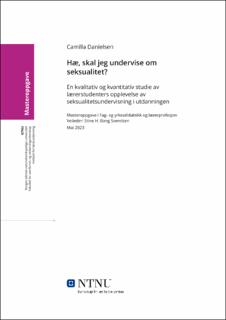| dc.contributor.advisor | Svendsen, Stine H. Bang | |
| dc.contributor.author | Danielsen, Camilla | |
| dc.date.accessioned | 2023-07-19T17:21:21Z | |
| dc.date.available | 2023-07-19T17:21:21Z | |
| dc.date.issued | 2023 | |
| dc.identifier | no.ntnu:inspera:139303940:50879231 | |
| dc.identifier.uri | https://hdl.handle.net/11250/3080376 | |
| dc.description.abstract | I mastergradsprosjektet har det blitt gjort en kvantitativ og kvalitativ studie, der metodene survey og fokusgruppeintervju ble brukt til datainnsamling. Det var hele 156 respondenter som besvarte surveyen, spørreundersøkelsen, som bestod av 12 selvutfyllende spørsmål. Jeg gjennomførte 3 fokusgruppeintervjuer med totalt 8 informanter.
Formålet med oppgaven er å belyse hvorvidt lærerstudenter får seksualitetsundervisning i lærerutdanningen, og hvilke oppfatninger og tanker lærerstudenter gjør seg om undervisning i seksualitet i samfunnsfag. Mine funn viser at under halvparten av respondentene har erfart å få seksualitetsundervisning i lærerutdanningen. Respondentene som har opplevd å få undervisning om seksualitet fikk det gjennom fagene pedagogikk og/eller naturfag. Ekstremt få har opplevd å få undervisning om seksualitet i samfunnsfag, KRLE og norsk.
Funnene knyttet til den kvalitative undersøkelsen indikerer at det er svært viktig at lærerstudenter får opplæring i hvordan undervise om seksualitet. Informanten som har fått undervisning i studieløpet, viser at hen er svært orientert i hva seksualitetsundervisning innebærer, har god begrepsforståelse og er svært reflektert.
Informantene som ikke har samme erfaring, gruer seg til å ha seksualitetsundervisning da kompetansen ikke strekker til. Flere informanter var ikke klar over at de skulle ha undervisning om seksualitet i samfunnsfag, og flertallet trodde seksualitetsundervisning kun var tilknyttet naturfag. Informantene uttrykte at det var utfordrende å koble seksualitet til barn og unge da flere mener seksualitet tilhører voksenlivet. Manglende faglige og didaktiske kunnskaper gjør at informantene ikke vet hvordan de ville snakket om seksualitet med barn og unge, hvordan tilpasse undervisningen til ulike alderstrinn, hvilke temaer som tilhører samfunnsfag, hvordan ordlegge seg eller organisere undervisningen.
Informantene tror kritikken mot dagens seksualitetsundervisning i sosiale medier er mye grunnet manglende kompetanse hos praktiserende lærere. Mange ønsker ikke å plassere seg i en situasjon man opplever ubehagelig, som kan være en årsak til at mange lærere ikke underviser om seksualitet. Økt seksualitetsundervisning i lærerutdanningene og mulighet til kompetansehev for lærere kan øke omfanget av seksualitetsundervisning som oppleves inkluderende, relevant og lærerik for alle barn og unge. | |
| dc.description.abstract | For this master thesis, quantitative and qualitative research has been conducted,using survey and focus group interview methods for data collection. A total of 156 respondents answered the survey, which consisted of 12 self-completion questions. I conducted three focus group interviews with a total of eight participants.
The purpose of this master thesis is to illuminate whether teacher-students receive sexual health education in the teacher education program and explore the future teachers' perceptions and thoughts about sexuality education in social studies. My main findings reveal that less than half of the participants have experienced tuition in sexual health education as part of their teacher education program. The respondents who learned about the subject acquired it through pedagogy and natural science courses. Few respondents report receiving education about sexual health in social science, religion, and Norwegian language and literature.
Based on this thesis's qualitative study, the results indicate the importance of new teachers receiving education on how to teach about sexual health in their education program. The one informant, who had acquired training in their study program, showed a deep understanding of sexual health education, had a good conceptual grasp, and displayed a high level of reflection.
Informants lacking similar experiences express anxiety about teaching sexuality in class due to their limited expertise. The majority of the informants were unaware that they should learn about sexual health in social science; they believed that the topic was solely related to natural science. The informants found it challenging to connect sexuality with children and adolescents as they believe sexuality is primarily associated with adulthood. A limited understanding of subject-specific and didactic knowledge causes the informants to feel uncertain about how to talk to adolescents about sexuality, how to differentiate this education for the various age groups, which topics belong in the realm of social studies, and how they should articulate themselves or organize the teaching in the classroom.
The informants believe that the criticism of sexual health education in social media primarily stems from schoolteacher’s insufficient expertise. Reluctancy to put oneself in a situation that one experiences as uncomfortable could explain why many teachers avoid teaching about sexual health in the classroom. By increasing sexual health education and raising professional development opportunities in the teacher education program, the subject can be expanded and enhanced in the classroom as more inclusive, relevant, and informative for all children and adolescents. | |
| dc.language | nob | |
| dc.publisher | NTNU | |
| dc.title | Hæ, skal jeg undervise om seksualitet?
En kvalitativ og kvantitativ studie av lærerstudenters opplevelse av seksualitetsundervisning i utdanningen | |
| dc.type | Master thesis | |
